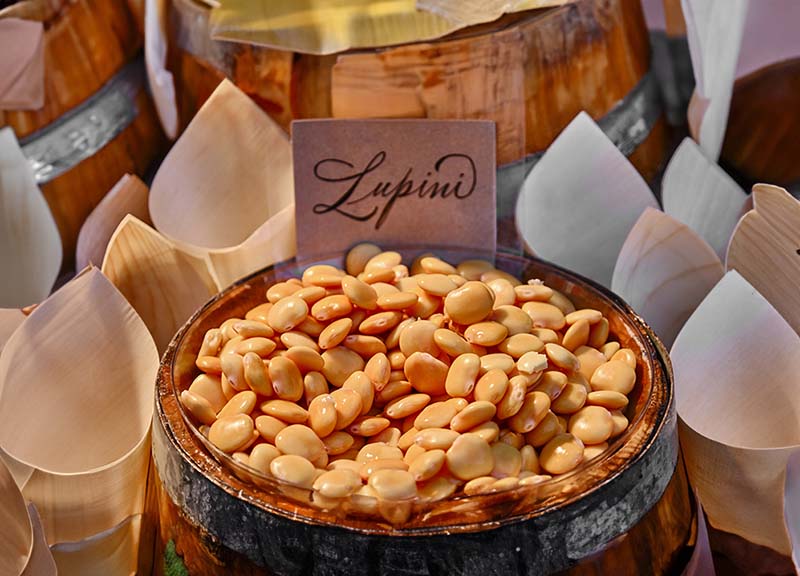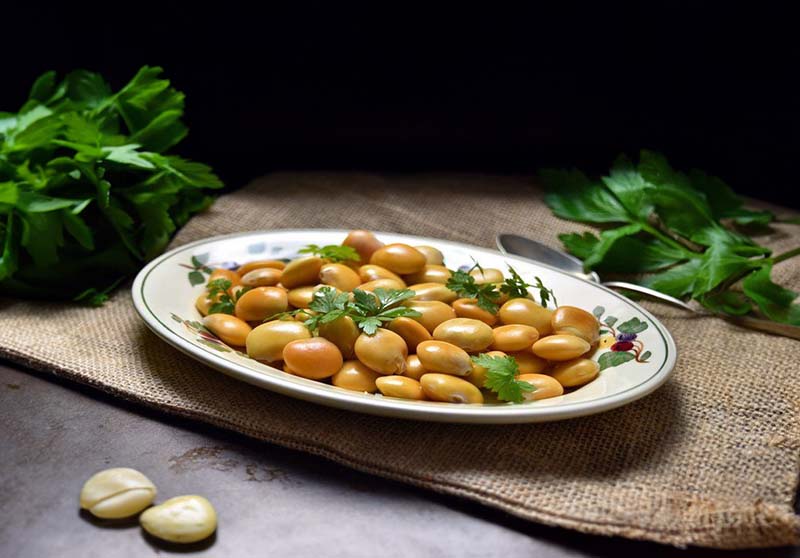“Are Lupini Beans Good for Weight Loss?” Lupini beans are great for your health and are full of nutrients and protein. They are especially good for people who don’t eat a lot of meat. They might be harder to find than other beans like lentils, but they’re worth it.
Lupini beans are really healthy, but they can taste bitter if you don’t cook them right. They’re a great choice if you want to eat healthier. Here’s why you should consider making lupini beans a regular part of your diet.
Related articles
- Celery Juice for Weight Loss: Slimming Down Made Easy.
- Are Cucumbers Good for Weight Loss? Unveiling the Truth.
- Is Lettuce Good for Weight Loss? The Surprising Diet Ally.

Are Lupini Beans Good for Weight Loss?
Lupini beans are great for losing weight because they are full of fiber and protein. These help you feel full longer, which can lead to eating less and taking in fewer calories. They’re also low in calories and carbs, making them a good food choice when you’re trying to slim down. Plus, they have lots of vitamins, minerals, and antioxidants, which are good for your overall health. Lupini beans for weight loss are known to help control hunger, so eating them can keep you satisfied for a long time.
Note: Adding lupini beans to your diet is a smart way to help with weight loss. Try snacking on some cooked lupini beans. They’re not just good for keeping your weight in check, but they also add important nutrients to your meals.

Nutrient Composition of Lupini Beans
A single cup (166g) of cooked, unsalted lupini beans packs about 193 calories and is rich in nutrients. It offers a substantial 25.9 grams of protein, 15.4 grams of carbohydrates, and a modest 4.65 grams of fat, alongside 4.65 grams of fiber. This makes lupini beans a nutritionally dense food.
These beans are also a great source of essential minerals like manganese, copper, magnesium, phosphorus, potassium, and zinc. Plus, they provide valuable nutrients such as folate and vitamin A.
Lupini beans are a nutritious choice, but it’s crucial to be aware of their sodium content, especially when choosing canned versions. Typically, lupini beans have minimal sodium. However, the canned variety often includes added salt for preservation and taste. For example, a well-known brand packs a hefty 960mg of sodium in just a half-cup serving. To put that into perspective, it’s nearly 42% of the 2300mg daily sodium limit recommended by the CDC.

Advantages of Lupini Beans
Lupini beans not only support digestive health but also contribute significantly to cardiovascular health.
Digestive Support
Rich in dietary fibers, lupini beans enhance digestive health. They aid regular bowel movements, reducing the risk of constipation and Irritable Bowel Syndrome (IBS). Trish Gomez, a Registered Dietitian Nutritionist and certified trainer, highlights that dietary fiber, combined with adequate fluid intake, improves both diarrhea and constipation.
Cardiovascular Health Enhancement
Hypertension, or high blood pressure, is a common global health issue. As a high-quality protein source, lupini beans can lower hypertension risk and improve heart health. Their active compounds can relax blood vessels, improving heart blood flow and managing cholesterol levels, thus reducing the risk of hypertension, stroke, and cardiovascular disease.

Gut Health Improvement
A healthy digestive system is crucial for overall health. Lupini beans, packed with dietary fibers, improve gut microbiota and intestinal health. They also reduce the growth of harmful intestinal bacteria, lowering the risk of intestinal disorders.
Anemia Management Potential
Lupini beans are high in vitamin C, which enhances iron absorption and supports hemoglobin production, reducing anemia risk. Vitamin C improves absorption of non-heme iron (found in plant foods), crucial for those with limited intake of heme iron sources like meat and seafood. Eating lupini beans regularly can help lessen symptoms of anemia, such as shortness of breath, dizziness, and fatigue.
Skin Health Enhancement
Lupini beans are rich in antioxidants, combating free radicals and oxidative stress, which slows aging and improves skin health. Shweta Shah, Founder of EatFit247, advises a diet rich in antioxidants like vitamins C and E for youthful, healthy skin. These antioxidants in lupini beans prevent dark spots, wrinkles, sagging skin, and reduce the risk of skin cancer. They nourish skin cells, promoting smooth, youthful skin.
Immunity Boosting
Lupini beans are enriched with immune-boosting vitamins like C, A, B, and magnesium, strengthening immunity and protecting against various health issues.
Blood Sugar Level Regulation
Lupini beans, high in dietary fiber and low in the glycemic index, are beneficial for blood glucose regulation. The conglutin in lupin seeds helps reduce blood glucose levels, making them a natural remedy for hyperglycemia and reducing the risk of type 2 diabetes.
Bone Health Improvement
Lupini beans, rich in calcium, magnesium, and proteins, support bone and muscle health, especially important with aging. They improve bone mineral density, reducing fracture risk, and enhance skeletal muscle health, improving mobility and quality of life.
Possible Drawbacks of Lupini Beans
Lupin beans offer many nutritional benefits, but it’s important to be aware of certain concerns.
Improper Preparation of Bitter Lupins (Lupin Poisoning): As highlighted earlier, bitter lupin beans contain quinolizidine alkaloids, which can be mildly toxic. If these beans aren’t soaked properly to reduce their alkaloid content, they could potentially cause side effects. Various methods exist to debitter lupin beans, and their effectiveness has been studied extensively. The European Food Safety Agency (EFSA) also conducted a safety evaluation of lupin beans and products. According to EFSA, consuming unprepared bitter lupin seeds might lead to neurological, digestive, and cardiovascular effects. However, such cases are rare and usually not life-threatening, as bitter lupins are often sold prepared and pickled in jars. Still, EFSA suggests more research is needed on lupin consumption. Remember, these concerns don’t apply to sweet lupin beans, the main commercial variety.
Allergies: Being in the same family as peanuts, lupin bean allergy is something to consider. In a study involving over 5,000 people, 17.1% of those with peanut allergies also reacted to lupin beans. Another study showed that out of 47 children with peanut allergies, 16 reacted to lupin in skin-prick tests. When nine of these children consumed lupin beans, two experienced allergic symptoms like itchy mouth and decreased peak expiratory flow rate.

Conclusion
Reflecting on the question, “Are lupini beans good for weight loss?”, the evidence is clear. These nutrient-rich legumes are an excellent choice for anyone looking to manage their weight effectively. With their impressive blend of fiber, protein, and low-caloric content, lupini beans are not only a healthful food option but also a tasty one.
We would love to hear about your experiences with lupini beans in your weight loss journey. Have they made a significant impact? Share your stories with us and join the conversation. Don’t forget to explore more informative and engaging blogs on HealthConnect for a wealth of health-related insights and tips.

Dr. Joyce Slater: Your Guide to Informed Health Choices
Dr. Joyce Slater shines as a distinguished expert in the field of nutrition and public health. Contributing her vast expertise to HealthConnectbc, she embodies a deep-seated passion for enhancing public well-being. As a respected figure in her field. Dr. Slater’s academic journey and professional achievements are nothing short of inspirational.
Holding a significant position as a researcher and educator, Dr. Slater has delved deeply into the intricacies of food literacy and nutritional science. Her work, prominently featured in numerous esteemed scientific publications, underscores her dedication to expanding our understanding of food’s role in health and society.
At the heart of Dr. Slater’s professional ethos is a profound desire to positively impact individual lives through education and research. She often says, “Empowering people with the knowledge to make healthier choices is the most rewarding aspect of my work.” This principle is the cornerstone of her involvement with HealthConnectbc, where she strives to provide reliable and practical health advice.
Dr. Slater’s contributions to HealthConnectbc are multifaceted: academically, she offers insights into the complex world of nutrition and health, enhancing both public understanding and professional practices. Additionally, she is instrumental in guiding and inspiring the next generation of health professionals, thus fostering future excellence in the field.
Juggling rigorous research with her educational duties, Dr. Slater demonstrates an unwavering commitment to her profession. Her approachable nature and genuine concern transcend the confines of academia, touching the lives of everyone she interacts with. Dr. Slater looks forward to continuing her journey of discovery and education, dedicated to the ongoing improvement of public health and nutrition.
At HealthConnectbc, Dr. J. Slater is not just a contributor; she is a guiding light, dedicated to enlightening and motivating individuals towards a healthier and more informed lifestyle.
PUBLISHED ARTICLES
- Food literacy competencies: A conceptual framework for youth transitioning to adulthood (2018)
- Self-perceived eating habits and food skills of Canadians (2016)
- Challenges to acquiring and utilizing food literacy: Perceptions of young Canadian adults (2016)
- Socio-demographic and geographic analysis of overweight and obesity in Canadian adults (2009)
- Sustainable well-being: Concepts, issues, and educational practices (2014)

